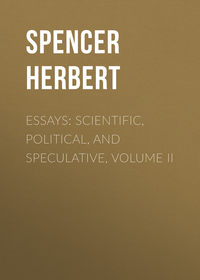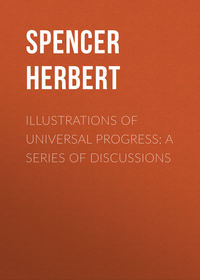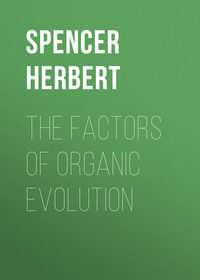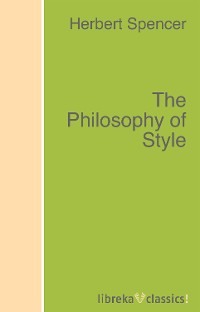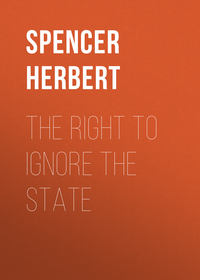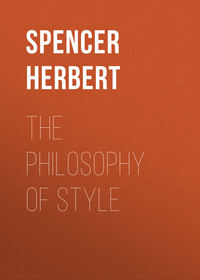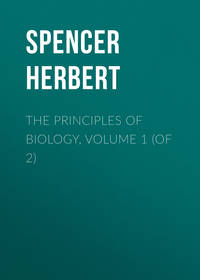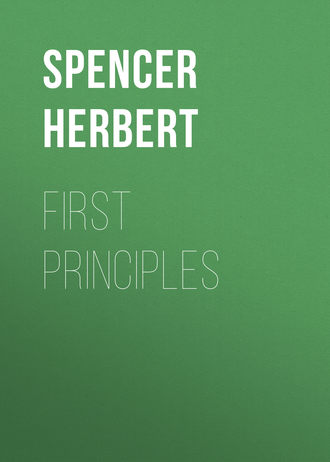 полная версия
полная версияFirst Principles
Meanwhile let us recognize whatever of permanent good there is in these persistent attempts to frame conceptions of that which cannot be conceived. From the beginning it has been only through the successive failures of such conceptions to satisfy the mind, that higher and higher ones have been gradually reached; and doubtless, the conceptions now current are indispensable as transitional modes of thought. Even more than this may be willingly conceded. It is possible, nay probable, that under their most abstract forms, ideas of this order will always continue to occupy the background of our consciousness. Very likely there will ever remain a need to give shape to that indefinite sense of an Ultimate Existence, which forms the basis of our intelligence. We shall always be under the necessity of contemplating it as some mode of being; that is – of representing it to ourselves in some form of thought, however vague. And we shall not err in doing this so long as we treat every notion we thus frame as merely a symbol, utterly without resemblance to that for which it stands. Perhaps the constant formation of such symbols and constant rejection of them as inadequate, may be hereafter, as it has hitherto been, a means of discipline. Perpetually to construct ideas requiring the utmost stretch of our faculties, and perpetually to find that such ideas must be abandoned as futile imaginations, may realize to us more fully than any other course, the greatness of that which we vainly strive to grasp. Such efforts and failures may serve to maintain in our minds a due sense of the incommensurable difference between the Conditioned and the Unconditioned. By continually seeking to know and being continually thrown back with a deepened conviction of the impossibility of knowing, we may keep alive the consciousness that it is alike our highest wisdom and our highest duty to regard that through which all things exist as The Unknowable.
§ 32. An immense majority will refuse with more or less of indignation, a belief seeming to them so shadowy and indefinite. Having always embodied the Ultimate Cause so far as was needful to its mental realization, they must necessarily resent the substitution of an Ultimate Cause which cannot be mentally realized at all. “You offer us,” they say, “an unthinkable abstraction in place of a Being towards whom we may entertain definite feelings. Though we are told that the Absolute is real, yet since we are not allowed to conceive it, it might as well be a pure negation. Instead of a Power which we can regard as having some sympathy with us, you would have us contemplate a Power to which no emotion whatever can be ascribed. And so we are to be deprived of the very substance of our faith.”
This kind of protest of necessity accompanies every change from a lower creed to a higher. The belief in a community of nature between himself and the object of his worship, has always been to man a satisfactory one; and he has always accepted with reluctance those successively less concrete conceptions which have been forced upon him. Doubtless, in all times and places, it has consoled the barbarian to think of his deities as so exactly like himself in nature, that they could be bribed by offerings of food; and the assurance that deities could not be so propitiated, must have been repugnant, because it deprived him of an easy method of gaining supernatural protection. To the Greeks it was manifestly a source of comfort that on occasions of difficulty they could obtain, through oracles, the advice of their gods, – nay, might even get the personal aid of their gods in battle; and it was probably a very genuine anger which they visited upon philosophers who called in question these gross ideas of their mythology. A religion which teaches the Hindoo that it is impossible to purchase eternal happiness by placing himself under the wheel of Juggernaut, can scarcely fail to seem a cruel one to him; since it deprives him of the pleasurable consciousness that he can at will exchange miseries for joys. Nor is it less clear that to our Catholic ancestors, the beliefs that crimes could be compounded for by the building of churches, that their own punishments and those of their relatives could be abridged by the saying of masses, and that divine aid or forgiveness might be gained through the intercession of saints, were highly solacing ones; and that Protestantism, in substituting the conception of a God so comparatively unlike ourselves as not to be influenced by such methods, must have appeared to them hard and cold. Naturally, therefore, we must expect a further step in the same direction to meet with a similar resistance from outraged sentiments. No mental revolution can be accomplished without more or less of laceration. Be it a change of habit or a change of conviction, it must, if the habit or conviction be strong, do violence to some of the feelings; and these must of course oppose it. For long-experienced, and therefore definite, sources of satisfaction, have to be substituted sources of satisfaction that have not been experienced, and are therefore indefinite. That which is relatively well known and real, has to be given up for that which is relatively unknown and ideal. And of course such an exchange cannot be made without a conflict involving pain. Especially then must there arise a strong antagonism to any alteration in so deep and vital a conception as that with which we are here dealing. Underlying, as this conception does, all others, a modification of it threatens to reduce the superstructure to ruins. Or to change the metaphor – being the root with which are connected our ideas of goodness, rectitude, or duty, it appears impossible that it should be transformed without causing these to wither away and die. The whole higher part of the nature almost of necessity takes up arms against a change which, by destroying the established associations of thought, seems to eradicate morality.
This is by no means all that has to be said for such protests. There is a much deeper meaning in them. They do not simply express the natural repugnance to a revolution of belief, here made specially intense by the vital importance of the belief to be revolutionized; but they also express an instinctive adhesion to a belief that is in one sense the best – the best for those who thus cling to it, though not abstractedly the best. For here let me remark that what were above spoken of as the imperfections of Religion, at first great but gradually diminishing, have been imperfections only as measured by an absolute standard; and not as measured by a relative one. Speaking generally, the religion current in each age and among each people, has been as near an approximation to the truth as it was then and there possible for men to receive: the more or less concrete forms in which it has embodied the truth, have simply been the means of making thinkable what would otherwise have been unthinkable; and so have for the time being served to increase its impressiveness. If we consider the conditions of the case, we shall find this to be an unavoidable conclusion. During each stage of evolution, men must think in such terms of thought as they possess. While all the conspicuous changes of which they can observe the origins, have men and animals as antecedents, they are unable to think of antecedents in general under any other shapes; and hence creative agencies are of necessity conceived by them in these shapes. If during this phase, these concrete conceptions were taken from them, and the attempt made to give them comparatively abstract conceptions, the result would be to leave their minds with none at all; since the substituted ones could not be mentally represented. Similarly with every successive stage of religious belief, down to the last. Though, as accumulating experiences slowly modify the earliest ideas of causal personalities, there grow up more general and vague ideas of them; yet these cannot be at once replaced by others still more general and vague. Further experiences must supply the needful further abstractions, before the mental void left by the destruction of such inferior ideas can be filled by ideas of a superior order. And at the present time, the refusal to abandon a relatively concrete notion for a relatively abstract one, implies the inability to frame the relatively abstract one; and so proves that the change would be premature and injurious. Still more clearly shall we see the injuriousness of any such premature change, on observing that the effects of a belief upon conduct must be diminished in proportion as the vividness with which it is realized becomes less. Evils and benefits akin to those which the savage has personally felt, or learned from those who have felt them, are the only evils and benefits he can understand; and these must be looked for as coming in ways, like those of which he has had experience. His deities must be imagined to have like motives and passions and methods with the beings around him; for motives and passions and methods of a higher character, being unknown to him, and in great measure unthinkable by him, cannot be so realized in thought as to influence his deeds. During every phase of civilization, the actions of the Unseen Reality, as well as the resulting rewards and punishments, being conceivable only in such forms as experience furnishes, to supplant them by higher ones before wider experiences have made higher ones conceivable, is to set up vague and uninfluential motives for definite and influential ones. Even now, for the great mass of men, unable through lack of culture to trace out with due clearness those good and bad consequences which conduct brings round through the established order of the Unknowable, it is needful that there should be vividly depicted future torments and future joys – pains and pleasures of a definite kind, produced in a manner direct and simple enough to be clearly imagined. Nay still more must be conceded. Few if any are as yet fitted wholly to dispense with such conceptions as are current. The highest abstractions take so great a mental power to realize with any vividness, and are so inoperative upon conduct unless they are vividly realized, that their regulative effects must for a long period to come be appreciable on but a small minority. To see clearly how a right or wrong act generates consequences, internal and external, that go on branching out more widely as years progress, requires a rare power of analysis. To mentally represent even a single series of these consequences, as it stretches out into the remote future, requires an equally rare power of imagination. And to estimate these consequences in their totality, ever multiplying in number while diminishing in intensity, requires a grasp of thought possessed by none. Yet it is only by such analysis, such imagination, and such grasp, that conduct can be rightly guided in the absence of all other control: only so can ultimate rewards and penalties be made to outweigh proximate pains and pleasures. Indeed, were it not that throughout the progress of the race, men’s experiences of the effects of conduct have been slowly generalized into principles – were it not that these principles have been from generation to generation insisted on by parents, upheld by public opinion, sanctified by religion, and enforced by threats of eternal damnation for disobedience – were it not that under these potent influences, habits have been modified, and the feelings proper to them made innate – were it not, in short, that we have been rendered in a considerable degree organically moral; it is certain that disastrous results would ensue from the removal of those strong and distinct motives which the current belief supplies. Even as it is, those who relinquish the faith in which they have been brought up, for this most abstract faith in which Science and Religion unite, may not uncommonly fail to act up to their convictions. Left to their organic morality, enforced only by general reasonings imperfectly wrought out and difficult to keep before the mind, their defects of nature will often come out more strongly than they would have done under their previous creed. The substituted creed can become adequately operative only when it becomes, like the present one, an element in early education, and has the support of a strong social sanction. Nor will men be quite ready for it until, through the continuance of a discipline which has already partially moulded them to the conditions of social existence, they are completely moulded to those conditions.
We must therefore recognize the resistance to a change of theological opinion, as in great measure salutary. It is not simply that strong and deep-rooted feelings are necessarily excited to antagonism – it is not simply that the highest moral sentiments join in the condemnation of a change which seems to undermine their authority; but it is that a real adaptation exists between an established belief and the natures of those who defend it; and that the tenacity of the defence measures the completeness of the adaptation. Forms of religion, like forms of government, must be fit for those who live under them; and in the one case as in the other, that form which is fittest is that for which there is an instinctive preference. As certainly as a barbarous race needs a harsh terrestrial rule, and habitually shows attachment to a despotism capable of the necessary rigour; so certainly does such a race need a belief in a celestial rule that is similarly harsh, and habitually shows attachment to such a belief. And just in the same way that the sudden substitution of free institutions for tyrannical ones, is sure to be followed by a reaction; so, if a creed full of dreadful ideal penalties is all at once replaced by one presenting ideal penalties that are comparatively gentle, there will inevitably be a return to some modification of the old belief. The parallelism holds yet further. During those early stages in which there is an extreme incongruity between the relatively best and the absolutely best, both political and religious changes, when at rare intervals they occur, are necessarily violent; and necessarily entail violent retrogressions. But as the incongruity between that which is and that which should be, diminishes, the changes become more moderate, and are succeeded by more moderate retrogressions; until, as these movements and counter-movements decrease in amount and increase in frequency, they merge into an almost continuous growth. That adhesion to old institutions and beliefs, which, in primitive societies, opposes an iron barrier to any advance, and which, after the barrier has been at length burst through, brings back the institutions and beliefs from that too-forward position to which the momentum of change had carried them, and so helps to re-adapt social conditions to the popular character – this adhesion to old institution and beliefs, eventually becomes the constant check by which the constant advance is prevented from being too rapid. This holds true of religious creeds and forms, as of civil ones. And so we learn that theological conservatism, like political conservatism, has an all-important function.
§ 33. That spirit of toleration which is so marked a characteristic of modern times, and is daily growing more conspicuous, has thus a far deeper meaning than is supposed. What we commonly regard simply as a due respect for the right of private judgment, is really a necessary condition to the balancing of the progressive and conservative tendencies – is a means of maintaining the adaptation between men’s beliefs and their natures. It is therefore a spirit to be fostered; and it is a spirit which the catholic thinker, who perceives the functions of these various conflicting creeds, should above all other men display. Doubtless whoever feels the greatness of the error to which his fellows cling and the greatness of the truth which they reject, will find it hard to show a due patience. It is hard for him to listen calmly to the futile arguments used in support of irrational doctrines, and to the misrepresentation of antagonist doctrines. It is hard for him to bear the manifestation of that pride of ignorance which so far exceeds the pride of science. Naturally enough such a one will be indignant when charged with irreligion because he declines to accept the carpenter-theory of creation as the most worthy one. He may think it needless as it is difficult, to conceal his repugnance to a creed which tacitly ascribes to The Unknowable a love of adulation such as would be despised in a human being. Convinced as he is that all punishment, as we see it wrought out in the order of nature, is but a disguised beneficence, there will perhaps escape from him an angry condemnation of the belief that punishment is a divine vengeance, and that divine vengeance is eternal. He may be tempted to show his contempt when he is told that actions instigated by an unselfish sympathy or by a pure love of rectitude, are intrinsically sinful; and that conduct is truly good only when it is due to a faith whose openly-professed motive is other-worldliness. But he must restrain such feelings. Though he may be unable to do this during the excitement of controversy, or when otherwise brought face to face with current superstitions, he must yet qualify his antagonism in calmer moments; so that his mature judgment and resulting conduct may be without bias.
To this end let him ever bear in mind three cardinal facts – two of them already dwelt upon, and one still to be pointed out. The first is that with which we set out; namely the existence of a fundamental verity under all forms of religion, however degraded. In each of them there is a soul of truth. Through the gross body of dogmas traditions and rites which contain it, it is always visible – dimly or clearly as the case may be. This it is which gives vitality even to the rudest creed; this it is which survives every modification; and this it is which we must not forget when condemning the forms under which it is presented. The second of these cardinal facts, set forth at length in the foregoing section, is, that while those concrete elements in which each creed embodies this soul of truth, are bad as measured by an absolute standard, they are good as measured by a relative standard. Though from higher perceptions they hide the abstract verity within them; yet to lower perceptions they render this verity more appreciable than it would otherwise be. They serve to make real and influential over men, that which would else be unreal and uninfluential. Or we may call them the protective envelopes, without which the contained truth would die. The remaining cardinal fact is, that these various beliefs are parts of the constituted order of things; and not accidental but necessary parts. Seeing how one or other of them is everywhere present; is of perennial growth; and when cut down, redevelops in a form but slightly modified; we cannot avoid the inference that they are needful accompaniments of human life, severally fitted to the societies in which they are indigenous. From the highest point of view, we must recognize them as elements in that great evolution of which the beginning and end are beyond our knowledge or conception – as modes of manifestation of The Unknowable; and as having this for their warrant.
Our toleration therefore should be the widest possible. Or rather, we should aim at something beyond toleration, as commonly understood. In dealing with alien beliefs, our endeavour must be, not simply to refrain from injustice of word or deed; but also to do justice by an open recognition of positive worth. We must qualify our disagreement with as much as may be of sympathy.
§ 34. These admissions will perhaps be held to imply, that the current theology should be passively accepted; or, at any rate, should not be actively opposed. “Why,” it may be asked, “if all creeds have an average fitness to their times and places, should we not rest content with that to which we are born? If the established belief contains an essential truth – if the forms under which it presents this truth, though intrinsically bad, are extrinsically good – if the abolition of these forms would be at present detrimental to the great majority – nay, if there are scarcely any to whom the ultimate and most abstract belief can furnish an adequate rule of life; surely it is wrong, for the present at least, to propagate this ultimate and most abstract belief.”
The reply is, that though existing religious ideas and institutions have an average adaptation to the characters of the people who live under them; yet, as these characters are ever changing, the adaptation is ever becoming imperfect; and the ideas and institutions need remodelling with a frequency proportionate to the rapidity of the change. Hence, while it is requisite that free play should be given to conservative thought and action, progressive thought and action must also have free play. Without the agency of both, there cannot be those continual re-adaptations which orderly progress demands.
Whoever hesitates to utter that which he thinks the highest truth, lest it should be too much in advance of the time, may reassure himself by looking at his acts from an impersonal point of view. Let him duly realize the fact that opinion is the agency through which character adapts external arrangements to itself – that his opinion rightly forms part of this agency – is a unit of force, constituting, with other such units, the general power which works out social changes; and he will perceive that he may properly give full utterance to his innermost conviction: leaving it to produce what effect it may. It is not for nothing that he has in him these sympathies with some principles and repugnance to others. He, with all his capacities, and aspirations, and beliefs, is not an accident, but a product of the time. He must remember that while he is a descendant of the past, he is a parent of the future; and that his thoughts are as children born to him, which he may not carelessly let die. He, like every other man, may properly consider himself as one of the myriad agencies through whom works the Unknown Cause; and when the Unknown Cause produces in him a certain belief, he is thereby authorized to profess and act out that belief. For, to render in their highest sense the words of the poet —
– Nature is made better by no mean,But nature makes that mean: over that artWhich you say adds to nature, is an artThat nature makes.Not as adventitious therefore will the wise man regard the faith which is in him. The highest truth he sees he will fearlessly utter; knowing that, let what may come of it, he is thus playing his right part in the world – knowing that if he can effect the change he aims at – well: if not – well also; though not so well.
These extracts are from an article entitled “Nature and God,” published in the National Review for October, 1860.
PART II.
LAWS OF THE KNOWABLE
CHAPTER I.
LAWS IN GENERAL
§ 35. We have seen that intellectual advance has been dual – has been towards the establishment of both a positively unknown and a positively known. In making ever more certain the inaccessibility of one kind of truth, experience has made ever more certain the accessibility of another kind. The differentiation of the knowable from the unknowable, is shown as much in the reduction of the one to perfect clearness, as in the reduction of the other to impenetrable mystery. Progressing enlightenment discloses a definite limit to human intelligence; and while all which lies on the other side of the limit, is, with increasing distinctness, seen to transcend our finite faculties, it grows more and more obvious that all which lies on this side of the limit may become an indisputable possession.
To speak specifically – it has been shown that though we can never learn the nature of that which is manifested to us, we are daily learning more completely the order of its manifestations. We are conscious of effects produced in us by something separate from ourselves. The effects of which we are conscious – the changes of consciousness which make up our mental life, we ascribe to the forces of an external world. The intrinsic character of these forces – of this external world – of that which underlies all appearances, we find inscrutable; as is also the internal something whose changes constitute consciousness, but at the same time we find that among the changes of consciousness thus produced, there exist various constant relations; and we have no choice but to ascribe constancy to the relations which subsist among the inscrutable causes of these changes. Observation early discloses certain invariable connexions of coexistence and sequence among phenomena. Accumulating experiences tend continually to augment the number of invariable connexions recognized. When, as in the later stages of civilization, there arises not only a diligent gathering together of experiences but a critical comparison of them, more remote and complex connexions are added to the list. And gradually there grows up the habit of regarding these uniformities of relation as characterizing all manifestations of the Unknowable. Under the endless variety and seeming irregularity, there is ever more clearly discerned that “constant course of procedure” which we call Law.


